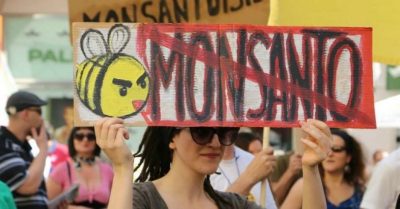EU Renews Use of Likely Carcinogenic Glyphosate Herbicide

VISIT MY NEW WEB SITE:
Contact at [email protected].
Monsanto has been selling glyphosate to farmers since 1974 – under the trade name Roundup, used to kill weeds without killing crops.
It’s currently the most commonly used herbicide in America – sales today 100-fold greater than when first introduced.
In March 2015, the World Health Organization’s International Agency for Research on Cancer classified glyphosate as “probably carcinogenic in humans” – based on epidemiological, animal, and in vitro studies.
In February 2016, a group of international scientists published a consensus statement – explaining the risks associated with increasing human exposure to glyphosate herbicides.
They noted its endocrine disruption in test tube and animal experiments studies.
Glyphosate residues are found in popular Western foods and drinks. Tests show most Americans have it in their urine. Any amount is unsafe.
In 2009, the International Endocrine Society warned of the dangers of chemicals that interact with, take the place of, or inhibit or stimulate the action of natural human hormones (endocrine disruptors – EDs).
Peer-reviewed research by international scientists show little doubt that glyphosate-based herbicides (GBHs) are endocrine disruptors, associated with a wide range of maladies, including cancer.
According to the International Agency for Research on Cancer, glyphosate exposure is linked to cancer in humans. Yet no regulatory action in America or Europe has been taken to ban its use.
On Monday, EU member states approved its renewal for another five years – 18 nations in favor, nine opposed, one abstaining – 16 yes votes needed for approval.
Germany’s 11th hour U-turn in favor of renewal outweighed French and Italian opposition. The European Commission ignored the European Parliament’s demand to phase out glyphosate on farms by 2020, urging restriction on its use in the interim – including a ban on non-professional use in public parks and gardens.
Permitting unrestricted glyphosate use ignores the health hazard it poses. For years, Monsanto has been ghostwriting studies, bankrolling EU scientists to call the product safe.
Evidence proves otherwise. According to Adrian Bebb from Friends of the Earth Europe, commenting on the EU vote:
“Glyphosate damages nature, probably causes cancer, and props up an industrial farming system that is degrading the land we need to feed ourselves.”
“Today’s approval, even if only for five years, is a missed opportunity to get rid of this risky weedkiller and start to get farmers off the chemical treadmill.”
“Five more years of glyphosate will put our health and environment at risk, and is a major setback to more sustainable farming methods.”
When used as directed, glyphosate is harmful to human health, a risk too great to ignore.
VISIT MY NEW WEB SITE: stephenlendman.org (Home – Stephen Lendman). Contact at [email protected].
My newest book as editor and contributor is titled “Flashpoint in Ukraine: How the US Drive for Hegemony Risks WW III.”

